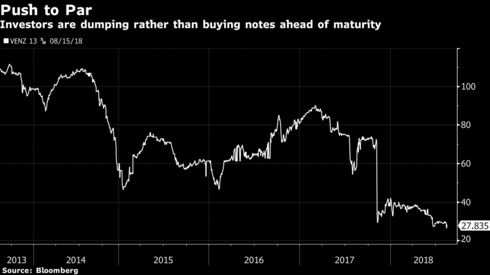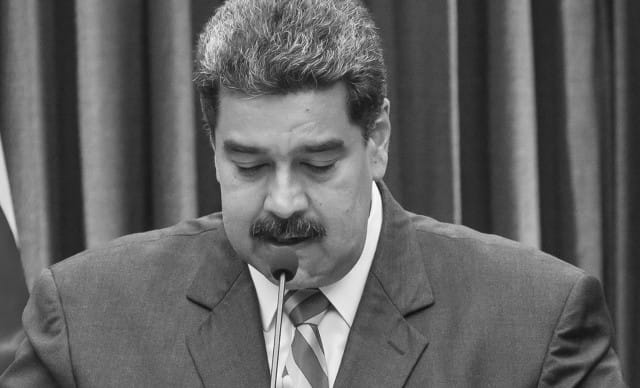Venezuela Has $1 Billion Due Today. The Bonds Trade at 28 Cents
- South American nation is about $5 billion behind on debt. Government is running out of money and oil production plunging
After all, the bond in question is already in default due to a missed interest payment back in February. Why would Nicolas Maduro’s government fork over hundreds of millions of dollars it can’t afford to part with when the nation and its flagship oil company are already about $5 billion in the hole with creditors?
The one new thing today is that this missed payment will mark the first default on government bond principal, rather than just interest payments. The notes are already trading at just 28 cents on the dollar, indicating the low level of hope among investors.

Still, creditors are beginning to get restless. Mining company Crystallex — which was forced into bankruptcy after Venezuela nationalized the Las Cristinas deposit — was told by a Delaware judge last week that it can seize shares of the nation’s largest U.S. asset, PDV Holding, the U.S. parent of PDVSA’s refining unit Citgo. Separately, an $8 billion bondholder group advised by Millstein & Co. has said it’s “exploring options” to ensure that Venezuela’s overseas assets are available to satisfy creditor claims.
Even the Petroleos de Venezuela bonds due in 2020 backed by a slice of Citgo which the government has been careful to pay have retreated to about 86 cents from 90 cents after the Delaware court decision, which is being appealed.
According to Siobhan Morden, Nomura’s Latin America fixed income strategist, the cash crunch is worsening with oil production collapsing another 50,000 barrels a day in July and the future looks bleak for Maduro — who is just beginning his second six-year term.
“We assume no funds allocated to make the sovereign amortization today as the first sovereign default and headline confirmation of cashflow stress,” Morden wrote in a note. “It still looks like a countdown with economic crisis morphing into political crisis for the Maduro administration.”
Where investors used to desperately ring public credit and payment agencies for signs of movement, all channels have gone quiet. Even the public credit office, which used to tweet out confirmation of payment, hasn’t sent a message related to sovereign bonds since November (hat tip to Siobhan). That was way back when Maduro called for an impossible debt restructuring that’s currently prohibited by U.S. sanctions.
— With assistance by Katia Porzecanski
